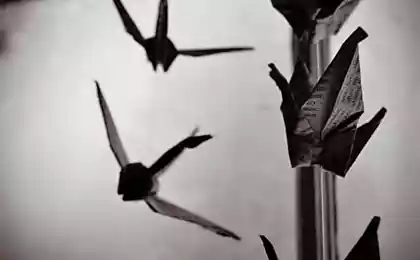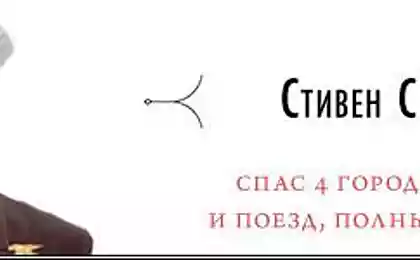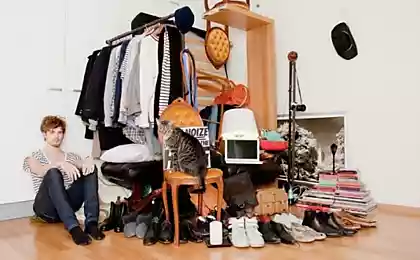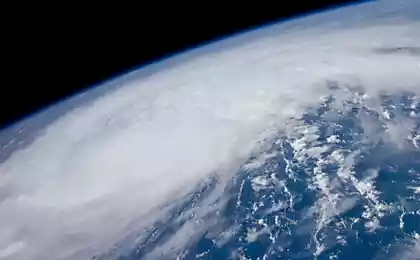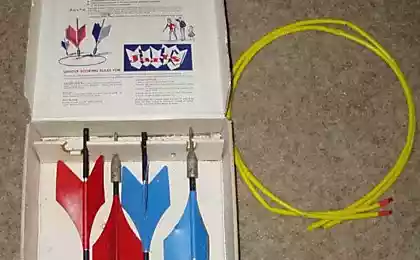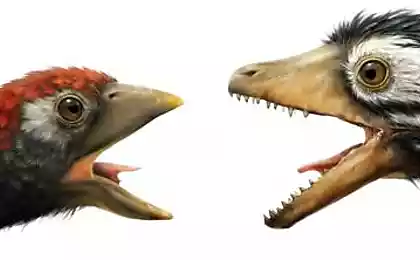759
10 terrible facts about how we are destroying the planet with the help of "innocent" of things
People are not the best way affect the planet. Various species of plants and animals are disappearing a thousand times faster than they should. Over 20 000 species now on the brink of extinction, and scientists are trying to figure out how we can spasti.Huzhe them all, that even seemingly harmless actions of people really only bring disaster. The site has collected a dozen examples of such "innocent" behavior.
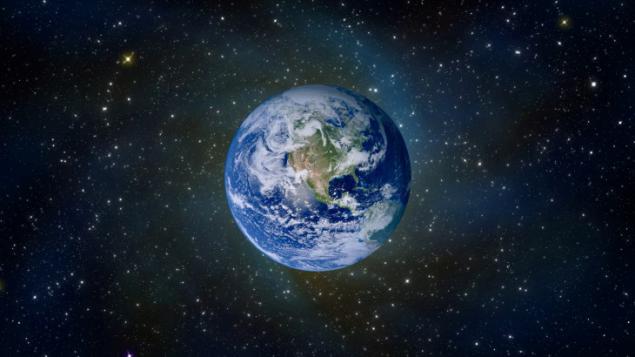
1. The use of disposable chopsticks edyBolshe all their produce in China - more than 80 billion a year! The vast majority of these sticks used and thrown out on the territory of China. This huge amount would be enough to cover the Beijing Tiananmen Square impermeable layer 360 times!
Unfortunately, for the production of 80 billion sticks annually Chinese felled 20 million trees, and not all in a row. Suitable only trees over 20 years old. Amazingly, the third largest country in the world in the near future may be left without any forests due to some sort of chopsticks!
2. Admission of birth control pills and other hormonal preparatovStochnye water greatly affect freshwater ecosystems: even the residual amount of estrogen into the environment, can wipe out dozens of species. For the record: estrogen - the active ingredient in birth control pills are also used in hormone replacement therapy.
In 2001, the estrogen in small quantities was introduced in freshwater lake research center in Ontario (Canada). The effect was almost instantaneous. The male fish began producing egg proteins, and then - to produce eggs. Even minimal amounts of estrogen was enough for their rebirth in females.
3. Admission antidepressantovUchёnye from York University fed earthworms, drank wastewater containing 3-5% of antidepressants, starlings, and then six months were observing.
A bird began to show the same side effects of antidepressants, as well as in humans. They are much less have lost their interest in the individuals of the opposite sex. And this is - a double whammy: poor nutrition makes the birds less, and the probability is high that they can not survive the winter, and the weakening of the libido, reduces the number of nesting. Is this the reason the number of starlings in the United States over the past 30 years decreased by 50 million individuals?
4. Use disposable straws napitkovPo According to the environmental organization Ocean Conservancy, straws are among the 10 most common types of waste in the oceans.
Staying on the surface of the water, straw and currents carried by the wind over long distances. They are made of polypropylene plastic - non-degradable and non-solvent material. So billions of discarded straws are in the oceans forever. It is expected that marine life annually swallow 10 to 25 tons of plastic. Every year more than a million birds are killed, after eating plastic.
5. Consumption myasaLyagushache frog meat has long been popular outside France. Most frogs in the world, Japan and the United States imports - more than 5 million individuals per year.
Experts say that many shipped from South America are infected frog chytrid fungus. Fortunately, it is harmless to humans. Fungus propagating through the living food not only propagates but hybridizes to other species. It is currently known about the more than 10 strains of chytrid fungus.
Scientists from the University of Michigan were able to track their interaction and the emergence of new, ever more deadly varieties, and argue that the the stability of the fungus infestation threatens the entire planet
6. The use of antibacterial soap in 2013 a study was conducted, during which experts tried to figure out what's going on with all sorts of anti-bacterial substances after they get into the sewers.
Most often in the modern household chemicals triclosan and triclocarban are used. Most of these substances are removed from the wastewater treatment plants, but something still remains.
The CDC has found traces of chemicals used in the production of antibacterial soap, in 76% of urine samples of Americans older than five years.
Other studies have shown that triclosan is present in the bodies of many animals - rats, amphibians, and so on. D. He has a strong influence on the thyroid gland. With the accumulation in the body of young individuals triclosan provokes accelerated puberty, leading to infertility, obesity and cancer
7. Content cats kvartirahBolee 75% of cat litter from different manufacturers are made from so-called bentonite clay - the substance with excellent wicking properties, while swelling increases in size in 12-14 times.
Bentonite clay mined in open pits. This is bad for the environment and for human beings. Mining of clays are increasingly destroying the surface of the soil.
There are dozens of alternative cat litter derived from recycled waste, paper, plant materials and other substances. Unfortunately, the process for their preparation - more expensive ...
8. Breeding fish and seafood fermahRazvedenie shrimp leads to severe degradation of coastal areas, disappearance of wetlands, increasing the salinity of land and water.
When breeding of salmon in the water significantly increases the concentration of fish droppings. In vivo And this problem is irrelevant, but when a lot of fish are grown on a small closed area, the ecosystem of the reservoir suffers greatly.
Waste sink to the bottom, which react with medicines and reagents used for cleaning fishing nets. This environment is favorable for the reproduction of sea lice. To destroy them, we have, in turn, use of other chemicals. As a result, water animals, living in the surrounding areas, the mass dying.
9. Consumption of food containing soy Recent research has shown that cultivation of soy has a devastating impact on the environment. Soybeans have long been used to create substitutes for milk, sausages and many other products. In addition, they are used in the manufacture of soaps and candles.
But not only people eat soy. Over 80% of the crop of this plant goes into feeding cattle. It is clear that the demand is huge, so it should be growing more and more space. Do not forget that used for this purpose area are cut down, and then fertilized with pesticides, causing enormous damage to natural ecosystems.
10. Food waste 28% of agricultural land cultivated products which are destined to be discarded. Needless to say, many species of animals and plants lost their usual habitat in the course of clearing these areas by man today are in danger of extinction ?
In addition, because of the food waste into the atmosphere each year gets 3, 3 billion tons of greenhouse gases.
Most of the waste generated in the processing of products, but also the percentage of municipal waste is also very high. For example, people often throw unspoiled fruits and vegetables simply because they are ugly and wrinkled appearance. Also, products with a shelf life of unfinished often in the garbage when their owners are buying more fresh.
It is not easy to realize that, even just by using antibacterial soap or buying fruit juices, we are doing great harm to the environment. The above facts prove once again how fragile the ecosystem in which we live. Even innocent at first glance, people's actions can cause extinction of thousands of species of living organisms.
via www.publy.ru/post/17705

1. The use of disposable chopsticks edyBolshe all their produce in China - more than 80 billion a year! The vast majority of these sticks used and thrown out on the territory of China. This huge amount would be enough to cover the Beijing Tiananmen Square impermeable layer 360 times!
Unfortunately, for the production of 80 billion sticks annually Chinese felled 20 million trees, and not all in a row. Suitable only trees over 20 years old. Amazingly, the third largest country in the world in the near future may be left without any forests due to some sort of chopsticks!
2. Admission of birth control pills and other hormonal preparatovStochnye water greatly affect freshwater ecosystems: even the residual amount of estrogen into the environment, can wipe out dozens of species. For the record: estrogen - the active ingredient in birth control pills are also used in hormone replacement therapy.
In 2001, the estrogen in small quantities was introduced in freshwater lake research center in Ontario (Canada). The effect was almost instantaneous. The male fish began producing egg proteins, and then - to produce eggs. Even minimal amounts of estrogen was enough for their rebirth in females.
3. Admission antidepressantovUchёnye from York University fed earthworms, drank wastewater containing 3-5% of antidepressants, starlings, and then six months were observing.
A bird began to show the same side effects of antidepressants, as well as in humans. They are much less have lost their interest in the individuals of the opposite sex. And this is - a double whammy: poor nutrition makes the birds less, and the probability is high that they can not survive the winter, and the weakening of the libido, reduces the number of nesting. Is this the reason the number of starlings in the United States over the past 30 years decreased by 50 million individuals?
4. Use disposable straws napitkovPo According to the environmental organization Ocean Conservancy, straws are among the 10 most common types of waste in the oceans.
Staying on the surface of the water, straw and currents carried by the wind over long distances. They are made of polypropylene plastic - non-degradable and non-solvent material. So billions of discarded straws are in the oceans forever. It is expected that marine life annually swallow 10 to 25 tons of plastic. Every year more than a million birds are killed, after eating plastic.
5. Consumption myasaLyagushache frog meat has long been popular outside France. Most frogs in the world, Japan and the United States imports - more than 5 million individuals per year.
Experts say that many shipped from South America are infected frog chytrid fungus. Fortunately, it is harmless to humans. Fungus propagating through the living food not only propagates but hybridizes to other species. It is currently known about the more than 10 strains of chytrid fungus.
Scientists from the University of Michigan were able to track their interaction and the emergence of new, ever more deadly varieties, and argue that the the stability of the fungus infestation threatens the entire planet
6. The use of antibacterial soap in 2013 a study was conducted, during which experts tried to figure out what's going on with all sorts of anti-bacterial substances after they get into the sewers.
Most often in the modern household chemicals triclosan and triclocarban are used. Most of these substances are removed from the wastewater treatment plants, but something still remains.
The CDC has found traces of chemicals used in the production of antibacterial soap, in 76% of urine samples of Americans older than five years.
Other studies have shown that triclosan is present in the bodies of many animals - rats, amphibians, and so on. D. He has a strong influence on the thyroid gland. With the accumulation in the body of young individuals triclosan provokes accelerated puberty, leading to infertility, obesity and cancer
7. Content cats kvartirahBolee 75% of cat litter from different manufacturers are made from so-called bentonite clay - the substance with excellent wicking properties, while swelling increases in size in 12-14 times.
Bentonite clay mined in open pits. This is bad for the environment and for human beings. Mining of clays are increasingly destroying the surface of the soil.
There are dozens of alternative cat litter derived from recycled waste, paper, plant materials and other substances. Unfortunately, the process for their preparation - more expensive ...
8. Breeding fish and seafood fermahRazvedenie shrimp leads to severe degradation of coastal areas, disappearance of wetlands, increasing the salinity of land and water.
When breeding of salmon in the water significantly increases the concentration of fish droppings. In vivo And this problem is irrelevant, but when a lot of fish are grown on a small closed area, the ecosystem of the reservoir suffers greatly.
Waste sink to the bottom, which react with medicines and reagents used for cleaning fishing nets. This environment is favorable for the reproduction of sea lice. To destroy them, we have, in turn, use of other chemicals. As a result, water animals, living in the surrounding areas, the mass dying.
9. Consumption of food containing soy Recent research has shown that cultivation of soy has a devastating impact on the environment. Soybeans have long been used to create substitutes for milk, sausages and many other products. In addition, they are used in the manufacture of soaps and candles.
But not only people eat soy. Over 80% of the crop of this plant goes into feeding cattle. It is clear that the demand is huge, so it should be growing more and more space. Do not forget that used for this purpose area are cut down, and then fertilized with pesticides, causing enormous damage to natural ecosystems.
10. Food waste 28% of agricultural land cultivated products which are destined to be discarded. Needless to say, many species of animals and plants lost their usual habitat in the course of clearing these areas by man today are in danger of extinction ?
In addition, because of the food waste into the atmosphere each year gets 3, 3 billion tons of greenhouse gases.
Most of the waste generated in the processing of products, but also the percentage of municipal waste is also very high. For example, people often throw unspoiled fruits and vegetables simply because they are ugly and wrinkled appearance. Also, products with a shelf life of unfinished often in the garbage when their owners are buying more fresh.
It is not easy to realize that, even just by using antibacterial soap or buying fruit juices, we are doing great harm to the environment. The above facts prove once again how fragile the ecosystem in which we live. Even innocent at first glance, people's actions can cause extinction of thousands of species of living organisms.
via www.publy.ru/post/17705
Apple from the tree ... 19 facts about the popular children of famous parents
Fengshui principles that will help to find each thing its place

